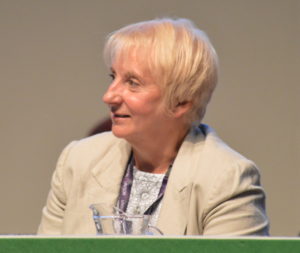
Local Government delegates gave unanimous backing for a motion from the Scottish Joint Council Committee for a campaign to ensure that UNISON members are actively involved in the governance of our pension schemes and funds.
The Scottish Local Government Pension Scheme already has UNISON seats on every pension board in each of the eleven funds; seats on the Scheme Advisory Board and a UNISON official is the Joint Secretary. The campaign will widen this to all parts of the UK.
Conference also recognised the benefits of bringing fund management in-house and called for greater transparency and scrutiny of costs by board members. It also pledged to take forward UNISON’s “Divestment from Fossil Fuels” campaigns with support for branches and board members.

An amendment from the National Young Members Forum will ensure that more young members are encouraged to be on Pensions Boards.
Moving the motion, Scotland’s Steven Larkin told delegates that after pay, pensions are the most important benefit we negotiate on behalf of our members.
“Yet most of us give our pension hardly a second thought,” said Steven, “It’s too complex, it’s a long way off, and I’ll leave it to the experts.
“Well that has to change,” warned Steven. “We have to persuade members that pensions are too important to leave to the industry ‘experts’ – who at best are not investing in our interest, at worst they are ripping us off.”
Steven added that with the introduction of better governance structures we have an opportunity to properly represent our members and change the way local government pension funds are run. In Scotland this means that UNISON is driving forward a positive agenda of pension reform – on benefits, transparency and a structural review of funds.
A key priority is tackling the lack of transparency over the fees charged by investment managers, warned Steven. This is a campaign UNISON has led on for several years – a cause that has now been taken up by the Financial Conduct Authority. Their study found that fund managers were overcharging clients for hundreds of billions of pounds worth of investments.
Steven slammed, “They enjoy huge profits and salaries, but performance is frequently mediocre.
“If low paid workers are to be encouraged to hand over their hard earned wages in higher pension contributions, then every possible penny needs to go into their pension pots, not the pockets of fat cats, who are currently ripping them off.”
Mark Ferguson, Scottish member of the Local Government Service Group Executive supported the amended motion and echoed Steven’s call for cost transparency.
“An agenda of cost transparency and scaling up the funds to make them more efficient through larger funds, in house asset managers and cost transparency is all happening because we argued for it,” said Mark, adding that if our sponsoring employers are paying less into the funds as a result of these initiatives then they will be far less likely to call for the closure of the LGPS defined benefits.
Mark added that the only other country with cost transparency is the Netherlands and their investment costs have been falling over the last 6 years.
“This is what we must aim for – If we are paying less in fees and transaction costs more money will become available to reduce costs or improve benefits.”
Steven welcomed the LGPS Transparency code which many of the biggest investment managers have signed up to and referred to the current consultation in Scotland on structural changes to our pension funds which will look at up-scaling – by cooperation, pooling or a full merger into one Scottish fund, with the economies of scale this provides.
He also pointed to UNISON Scotland’s involvement in the recently published Ferret/Guardian investigation into PFI scheme investments.
“Huge sums of public money and our members pensions contributions going into tax dodging schemes is frankly scandalous,” slammed Steven, calling on us to redouble our efforts to end both PFI and the tax dodging that does so much to damage our public services.
Steven welcomed the launch of the Local Government Pension Funds – Divest from Carbon Campaign: A UNISON Guide, which provides details of the impact of climate change and the role that our pension funds play in contributing to the problem, whilst laying out details of how branches and regions can campaign to influence pension boards to adopt a divestment strategy.
He urged support for this realistic programme of action that puts pensions at the heart of our bargaining, campaigning and organising strategies.
Mark confirmed that UNISON will be providing training at regional level to ensure that activists understand how LGPS investing works and how they can influence their funds to use investing power that can change company behaviour.

Mark concluded by paying tribute to “our friend and colleague” Carol Ball, SGE Vice Chair who is retiring in September.
“I know she will spend her lump sum wisely and help the Italian economy by spending it mostly on Prosecco and holidays,” said Mark to laughter and applause.
